
地址: 河南省焦作市高新区世纪路2001号[454000] Tel: 0391-3987069 E-mail: zkxb@hpu.edu.cn,skxb@hpu.edu.cn |

请您访问
|

社会科学版
|
| 供稿: 苗珊珊;肖岚 | 时间: 2018-12-05 | 次数: |
作者单位:河南理工大学安全与应急管理研究中心;河南理工大学应急管理学院
摘要:近来年,我国生猪疫病突发事件频发,带来了较为严重的社会影响。合理的生猪疫病突发事件应对策略有助于降低风险、减少损失。通过相关的应急管理理论,对生猪疫病的全周期机理进行分析,发现生猪疫病发生初期存在人为过失等可避免风险因子,其影响范围的不断扩大主要通过空间的扩大和烈度的增强两个方向,同时验证了生猪疫病突发事件将会导致猪肉价格异动事件和舆情事件的发生。在机理分析的基础上,对生猪疫病突发事件的预警、处置和收尾3个阶段进行应对策略分析。结果表明,提高预警灵敏度、优化生猪疫病的处置及协调机制、建立起完善的猪肉价格稳控和供给保障机制、做好舆情信息的发布与疏导等策略,有助于全面提升防疫效果。
基金:国家自然科学基金资助项目(71503071);河南省高等学校哲学社会科学研究优秀学者资助项目(2017-YXXZ-03);河南省哲学社会科学规划项目(2016BJJ018);
DOI:10.16698/j.hpu(social.sciences).1673-9779.2018.02.007
分类号:S858.28
Abstract:In recent years, swine epidemic occurs frequently in China, which has serious economic and social impacts. Empirically analyzing the impact of epidemic emergency and exploring the risk factors causing the epidemic, we found that there are human fault and other risk factors, which can be avoided, in the early stages of the swine epidemic. Such emergency extended in two ways: the expansion of space and the revising of the intensity. We also verified that the epidemic can result in the fluctuation of pork price and public opinions. Based on the mechanism analysis, we put forward the relevant policy suggestions on how to improve the monitoring and early warning sensitivity, to optimize the disposal and coordination mechanism, to stable epidemic-induced price changes and to eliminate the public panic.